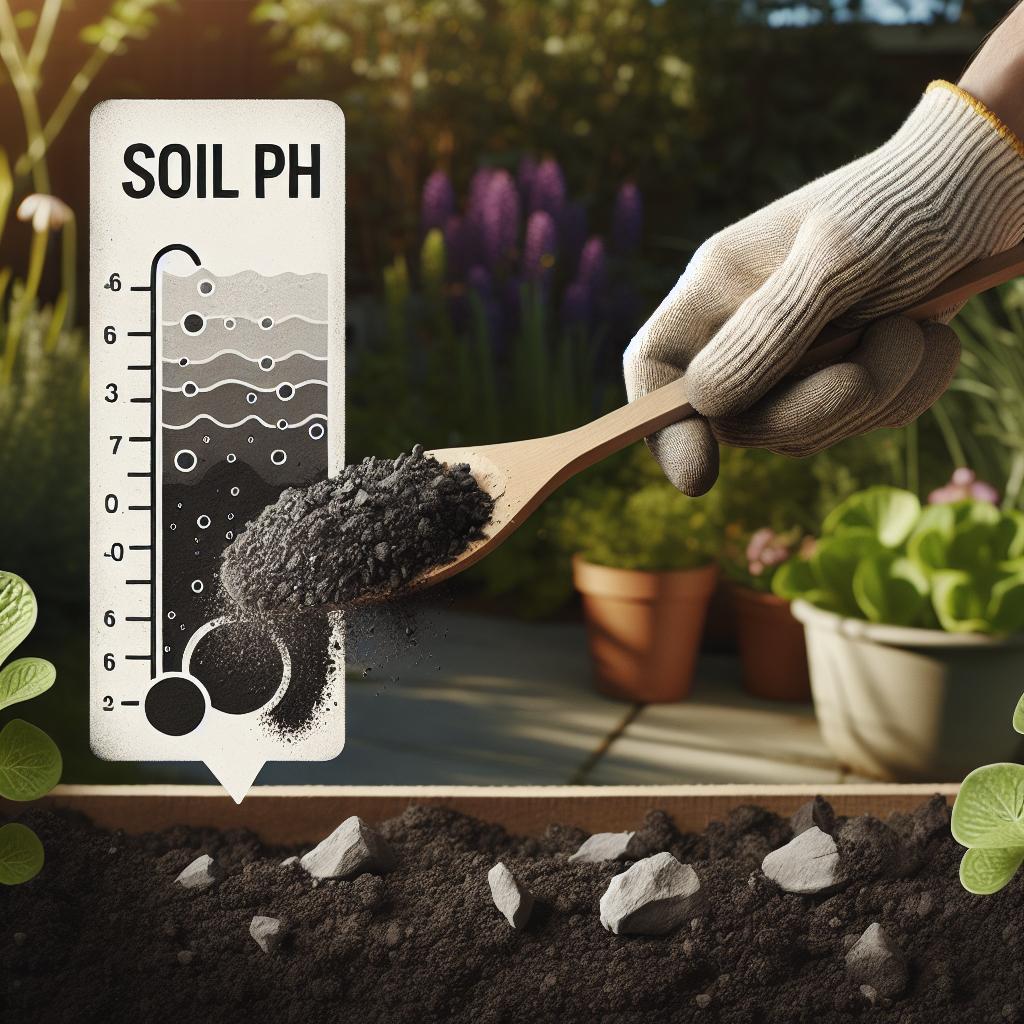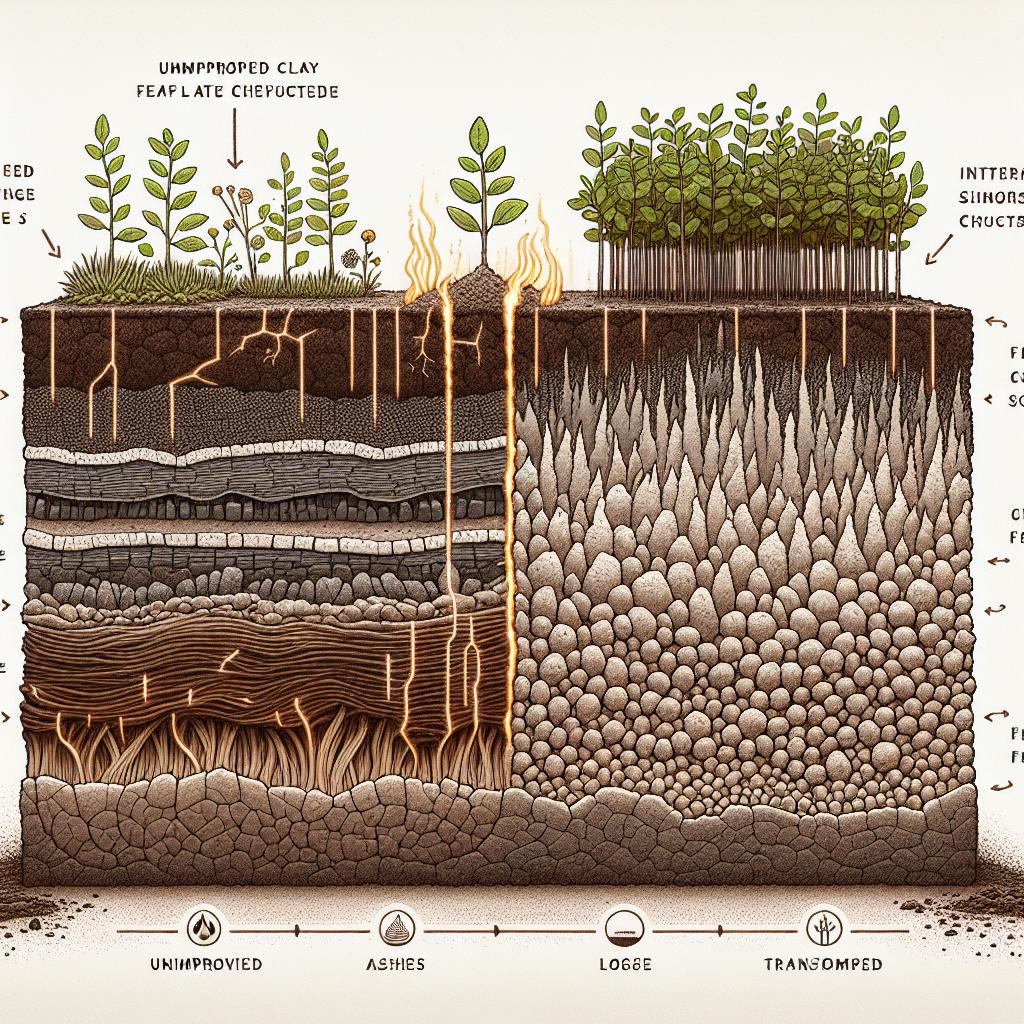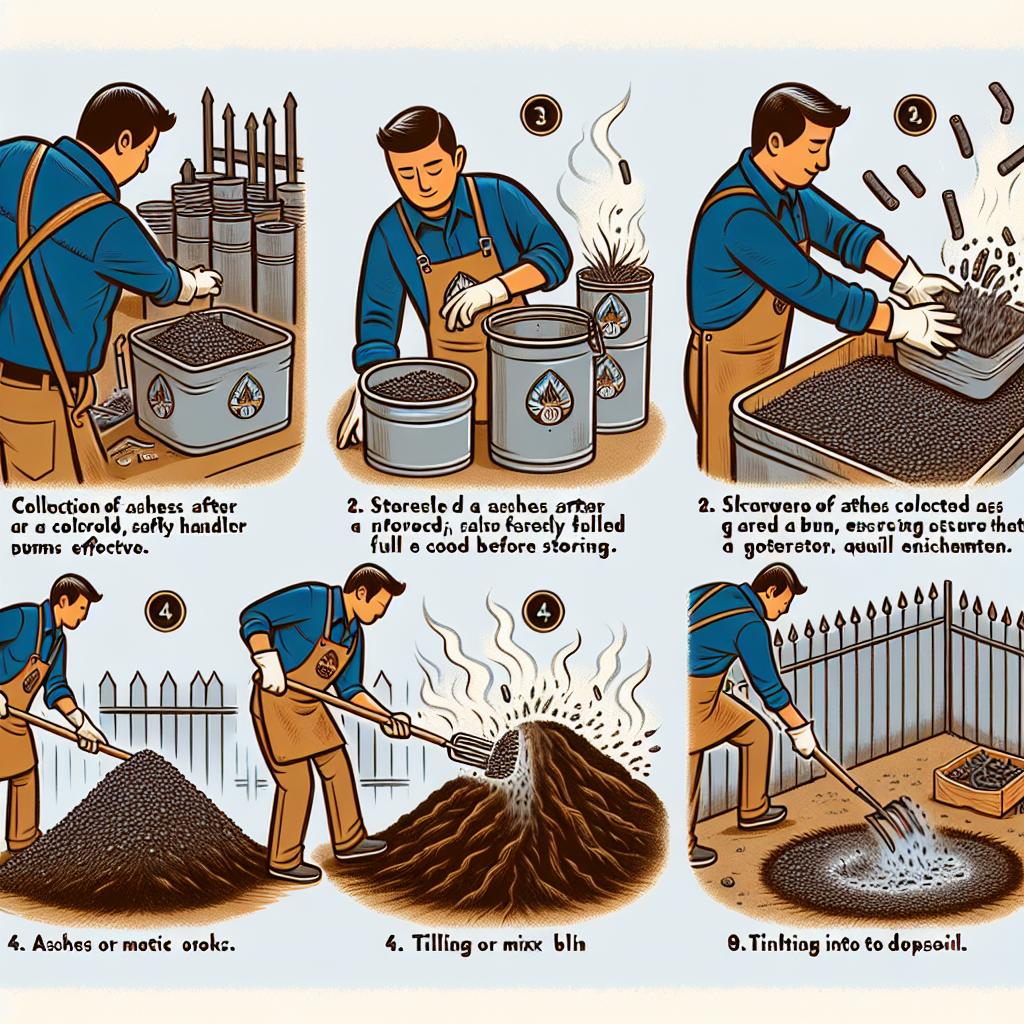In the ancient art of gardening, amidst blooming flowers and whispering trees, lies a mysterious query waiting to be unraveled: are ashes good for gardens? As we delve deep into the heart of this botanical conundrum, we shall embark upon a journey that intertwines the remnants of fire with the lush greenery of our beloved gardens. Are these powdery remnants of combustion a secret fertilizer, fueling the growth of vibrant blossoms, or are they naught but a layer of soot, concealing a world of horticultural misfortunes? Let us embark on this quest to discover the truth about the enigmatic relationship between ashes and gardens, and uncover the secrets that lie within the carbonized depths. Together, we shall sift through the ashes of knowledge, and mayhaps nurture a garden full of insights along the way.

Are Ashes Beneficial for Gardens?
There has been much debate on whether ashes can be beneficial for gardens, and the answer may surprise you. While ashes are often associated with waste or debris, they can actually provide several advantages when used correctly in gardening. Here are some reasons why ashes can be good for your garden:
- Soil amendment: The high alkaline content of wood ashes can help balance the pH levels in acidic soils, making it more favorable for nutrient uptake by plants. This is especially beneficial for plants that prefer slightly alkaline conditions, such as lilacs or asparagus.
- Source of nutrients: Wood ashes contain valuable nutrients like potassium, calcium, and phosphorus, which are essential for plant growth. When used in moderation, these nutrients can enhance the overall health and fertility of the soil.
- Natural pest control: Believe it or not, ashes can act as a natural deterrent against certain pests. Sprinkling ashes around the base of plants can help repel slugs, snails, and even some types of crawling insects. This eco-friendly alternative can keep your garden critter-free without the use of harmful pesticides.
However, it’s important to note that not all ashes are suitable for garden use. Only wood ashes from natural materials, such as untreated wood or hardwood, should be applied to your garden. Avoid using ashes from synthetic materials or coal, as they can contain harmful chemicals or heavy metals that can be detrimental to both plants and soil quality.

Soil Amendment: Understanding the Benefits of Ashes
When it comes to garden maintenance, finding the right soil amendment can make a world of difference in the health and productivity of your plants. One often overlooked option is the use of ashes. Known for their reputation in fireplaces and barbecues, ashes actually have a surprising number of benefits when it comes to gardening. By understanding how ashes can improve your garden’s soil, you can harness their power to create an environment that nurtures healthy growth and abundant harvests.
Fertility Boost: Ashes are rich in essential nutrients, making them a fantastic source of replenishment for your garden soil. They contain a wide range of minerals like potassium, calcium, and magnesium, which are all crucial for plant growth. By adding ashes to your soil, you can enhance its fertility, providing your plants with the necessary elements to thrive.
Reducing Acidity: If your soil is too acidic, incorporating ashes can help balance its pH levels. Ashes have alkaline properties that can neutralize the acidity in the soil, creating a more ideal environment for your plants. This adjustment can promote better nutrient absorption, supporting stronger root systems and healthier overall growth.
Pest Control: Ashes also offer a natural solution to ward off common garden pests. Spread a thin layer of ashes around vulnerable plants to create a barrier that deters slugs and snails. The abrasiveness and desiccating effect of the ashes can help protect your precious plants from these pesky invaders.
| Benefit | Description |
|---|---|
| Improved Aeration | Light ashes can help loosen compacted soil, allowing for better water drainage and increased oxygen levels. |
| Weed Suppression | Applying ashes as a mulch layer can hinder weed germination and growth, minimizing the need for frequent weeding. |
| Composting Aid | Mixing ashes with organic waste can promote the decomposition process and accelerate the production of nutrient-rich compost. |

Chemical Composition: Unraveling the Nutrients in Ashes
When it comes to gardening, it’s essential to provide your plants with the right nutrients for them to thrive. While it might sound surprising, ashes can actually be a valuable addition to your garden soil. Ashes are the residue left behind after burning wood or other organic materials. They contain a variety of essential elements that can benefit your garden in numerous ways.
One of the main benefits of using ashes in your garden is their chemical composition. Ashes are a source of vital nutrients such as potassium, calcium, and phosphorus. These nutrients are essential for plant growth and development. Potassium, for example, plays a crucial role in fruit production, root development, and disease resistance. Calcium helps strengthen the cell walls of plants, making them more resilient. Phosphorus is vital for energy transfer and promotes healthy root systems. By adding ashes to your garden, you are enriching the soil and ensuring that your plants have access to these essential elements.

Balancing Soil pH: How Ashes Can Help
Conventional wisdom might lead you to believe that ashes from your fireplace or bonfire are nothing more than messy waste. However, when it comes to gardening, those ashes can actually be incredibly beneficial. They can help to balance the pH of your soil, creating the ideal conditions for healthy plants to thrive.
When wood burns, it produces what is known as wood ash. This ash is comprised of a variety of minerals that are essential for plant growth, including potassium, phosphorus, and calcium. This combination of minerals can help to neutralize acidic soil, raising the pH level and making it more alkaline. By adding a thin layer of ashes to your garden soil, you can create an environment that is more favorable for plants that prefer a less acidic soil pH.
- Wood ash can increase the pH level of acidic soil, helping to create a more balanced environment for plants.
- Ashes can provide valuable minerals like potassium, phosphorus, and calcium, which are essential for plant growth.
- Using ashes in your garden can help to deter pests like slugs and snails, thanks to the alkaline properties of the ash.
In addition to balancing pH levels and providing essential nutrients, wood ash can also be helpful for controlling pests in your garden. The alkaline properties of the ash can act as a deterrent to common garden pests like slugs and snails. Sprinkling a thin layer of ashes around the base of susceptible plants can create a barrier that keeps these unwanted visitors at bay, allowing your plants to flourish.
| Benefits of Using Ashes in Your Garden |
|---|
| Increased pH levels in acidic soil |
| Valuable minerals for plant growth |
| Natural pest control |
While using wood ashes in your garden can be beneficial, it is important to exercise caution and use them in moderation. Too much ash can raise the soil pH too high, causing imbalances that can harm plants. Monitor your soil regularly and test its pH level throughout the gardening season to ensure you are maintaining a healthy balance for optimal plant growth.

Improving Soil Structure: The Impact of Ashes on Soil Texture
The impact of ashes on soil texture is a topic that has piqued the curiosity of many garden enthusiasts. While some may be hesitant to incorporate ashes into their gardening routine, there is evidence to suggest that they can indeed be beneficial for gardens. Ashes, particularly from wood or plant-based materials, have been found to improve soil structure by influencing its texture.
One way ashes can contribute to better soil structure is through their high mineral content. Wood ashes, for instance, are rich in potassium, calcium, and magnesium. These essential nutrients play a crucial role in promoting healthy root development and overall plant growth. When mixed into the soil, the minerals released by the ashes can help enhance its texture, making it more suitable for plant growth.
Moreover, ashes possess alkaline properties. This means they can help neutralize acidic soil, which can be detrimental to many plants. Alkaline ashes serve as a natural soil amendment, ensuring that the pH level remains balanced and conducive to plant growth. By incorporating ashes into your gardening routine, you can create an optimal environment for your plants to thrive.
In conclusion, while some may be skeptical about the use of ashes in gardens, there are compelling reasons to embrace their benefits. The mineral-rich content and alkaline properties of ashes can significantly improve soil structure and texture, leading to healthier plant growth. So, the next time you have some wood or plant-based ashes on hand, don’t be hesitant to sprinkle them into your garden beds – your plants will surely thank you for it!
Reducing Pest Infestations: Ashes as a Natural Repellent
Many gardeners are constantly on the lookout for natural solutions to keep their plants healthy and free from pests. One unconventional method that has gained attention is the use of ashes as a natural repellent. Although it may seem unusual, ashes have been used for centuries as a way to reduce pest infestations in gardens.
So, how exactly do ashes help in pest control? The secret lies in their composition. Ashes are rich in minerals such as calcium, potassium, and phosphorus, which are essential for healthy plant growth. By sprinkling a thin layer of ashes around your garden, you not only provide these important nutrients to the soil but also create an alkaline environment that repels many common garden pests.
This natural repellent effect works particularly well against soft-bodied insects like slugs, snails, and caterpillars, which dislike the dry and abrasive texture of ashes. Additionally, the high potassium content in ashes acts as a deterrent for aphids, which are known to feed on plants and spread diseases. By simply incorporating ashes into your gardening routine, you can reduce the likelihood of encountering these unwanted visitors and ensure the health and vitality of your plants.
While ashes can be an effective natural repellent, it’s important to use them with caution. Too much ash can raise the pH level of the soil too high, which could negatively impact certain plant species that prefer acidic conditions. It’s best to conduct a soil test before applying ashes and adjust the quantity accordingly to maintain a balanced pH level.
In conclusion, ashes can be a beneficial addition to your gardening arsenal when it comes to reducing pest infestations. Their mineral-rich composition and alkaline properties make them an effective natural repellent against soft-bodied insects and aphids. Just remember to use ashes in moderation and monitor the pH level of your soil to ensure the optimal conditions for your plants’ growth.

Weed Control: Using Ashes to Suppress Unwanted Plant Growth
When it comes to keeping unwanted plants at bay in your garden, you might be surprised to learn that ashes can actually be quite effective. Many people associate ashes with fireplaces and barbecues, but they can also serve as a natural weed control solution. Using ashes to suppress unwanted plant growth is a time-tested method that has been used for generations, and it can be a great alternative to chemical herbicides.
One of the main benefits of using ashes in your garden is that they contain essential nutrients that can enrich the soil. Ashes are a great source of potassium, which is an important nutrient for plants. Furthermore, ashes also contain trace amounts of other minerals such as calcium and magnesium, which can help promote healthy plant growth. By incorporating ashes into the soil, you can improve its fertility and create a more favorable environment for your desired plants to thrive.

Application Techniques: Best Practices for Using Ashes in the Garden
When it comes to utilizing the power of ashes in your garden, understanding the best practices for application techniques is essential. Ashes can be a valuable resource, rich in potassium and trace elements, which can enhance the soil’s fertility and foster healthy plant growth. However, it is crucial to use them correctly to avoid any potential negative effects on your plants.
Here are some key tips to ensure you make the most of ashes in your garden:
- Choose the right ashes: Not all ashes are suitable for gardening. Make sure you use only the ashes generated from clean, untreated wood or plant material. Avoid using ashes from sources like coal or charcoal, as they may contain harmful substances.
- Apply with caution: Ashes are alkaline in nature, so they can raise the pH level of your soil over time. Test your soil’s pH before applying ashes and monitor it regularly. Aim for a pH range of 6 to 7, as most plants thrive in slightly acidic to neutral conditions.
- Go light and spread evenly: Don’t go overboard with ashes. Applying a thin layer is enough to provide the necessary nutrients without overwhelming your plants. Use a garden rake or a broadcasting spreader to ensure even distribution across your garden beds.
Remember that moderation is key when using ashes in the garden. Excessive application can harm plants and negatively impact soil health. However, when used correctly, ashes can be a wonderful addition to your gardening routine, boosting nutrient levels and supporting vibrant plant life.
| Ash Source | Best for | Not Recommended for |
|---|---|---|
| Clean wood or plant material | Fertilizing vegetable gardens and flower beds | Potted plants and acid-loving plants like azaleas or rhododendrons |
| Coal | Fruit trees and food crops | |
| Charcoal | All plants |
Q&A
Q: Are you tired of boring gardens? Looking for something unique to spice up your green space? Wondering if ashes could be the secret ingredient to enhance your garden’s beauty? Well, you’ve come to the right place! In this article, we’ll explore the question, ”Are ashes good for gardens?” So, let’s dive straight into the fiery world of ash gardening!
Q: What exactly are ashes?
A: Ashes are the powdery remains left after burning organic materials such as wood, leaves, or even paper. They contain various micronutrients that can benefit your plants when used judiciously.
Q: Can ashes be beneficial to plants?
A: Absolutely! Ashes can act as a fantastic natural fertilizer, providing plants with essential nutrients like potassium, phosphorus, and calcium. They also act as a natural deterrent to certain garden pests, such as slugs and snails, due to their alkaline properties.
Q: How should I use ashes in my garden?
A: The key to using ashes effectively is moderation. Sprinkle a thin layer of ashes around your plants or incorporate them into the soil to balance pH levels. Keep in mind that some plants prefer acidic soil, so it’s essential to be cautious when applying ashes. Additionally, avoid using ashes derived from materials like coal or charcoal, as they can be harmful to your garden.
Q: Are ashes safe for vegetable gardens?
A: Yes, but with a word of caution. Ashes should be sparingly used in vegetable gardens, particularly when it comes to leafy greens like lettuce or spinach. The alkalinity of the ashes can hinder the growth of these crops. However, using a minimal amount of ashes in vegetable patches can still be beneficial to plants like tomatoes, peppers, or beans, which thrive in a slightly alkaline environment.
Q: Are there any plants that particularly love ashes?
A: Absolutely! Some plants, such as lavender, roses, lilacs, and certain deciduous trees, adore alkaline soil. So, incorporating ashes into their growing space can be a game-changer, making them flourish like never before.
Q: Can ashes have any negative impacts?
A: While ashes undoubtedly possess numerous benefits, they should be used in moderation. Excessive usage of ashes can lead to a significant increase in soil pH, which can harm plants that thrive in acidic conditions. Always test your soil regularly and monitor plant health to maintain the proper balance.
Q: Can I use ashes from a fireplace or bonfire?
A: Yes, if the ashes are derived from the burning of untreated wood. Avoid using ashes contaminated with synthetic materials, chemicals, or toxic substances, as these can be detrimental to both your garden and the environment.
Q: Should I always use ashes in my garden?
A: Ashes can indeed be utilized beneficially in gardens, but they are not a one-size-fits-all solution. It’s essential to consider the garden’s unique needs, the plants you are growing, and their preferred soil conditions. Additionally, seeking expert advice or conducting soil tests can provide valuable insights for optimal plant growth.
Now that you’re armed with the knowledge about ashes, go ahead and experiment! Embrace the transformative power of these tiny, powdery particles by incorporating them into your garden. Remember, a dash of creativity and a sprinkle of ashes may just be the secret recipe for a flourishing and captivating garden.
Closing Remarks
In the rhythmic dance of life and death, there exists a hidden symbiosis that transcends our understanding of the natural world. We contemplate the question, “Are ashes good for gardens?” as we tiptoe through the delicate balance of decay and rebirth. Ganja, our green-thumbed guide, has led us down a garden path, exploring the intriguing relationship between ashes and the bountiful embrace of Mother Earth.
Through our journey, we have discovered the enchanting tale of ash, a humble byproduct of destruction, transforming into a phoenix of fertility. As the bittersweet embers of a once-flamboyant flame cool down, they surrender the remnants of their former glory to the earth beneath. It is here, amidst the verdant tapestry of nature, that the cycle finds nourishment for its endless repetition.
The realm of gardens is a sanctuary where ashes find solace, offering a secret handshake to the roots that cradle life. As they softly dissolve into the soil, this powder of remembrance bestows a plethora of gifts upon the garden’s inhabitants. Trace elements of potassium, phosphorus, and calcium gently awaken the dormant potential within the earth, as the ashes become the symphony that plants can harmonize with.
But like any delicate dance, balance must be found. As we marvel at the powers of the ashes, we must also heed caution. Too rich a serving of ashes may tip the scales, causing potential harm to the garden’s delicate ecosystem. Like a gentle whisper upon the breeze, moderation is the key to unlock nature’s fullest potential.
So, dear reader, as you stand at the crossroads of gardening wisdom, pondering the luminous question of ashes in your garden sanctuary, remember the symphony they hold within their silent embrace. Whether dispersing this powdery treasure in subtle moderation or allowing the delicate balance of nature to guide your hand, the choice lies within your enchanting grasp.
In a world where life and death swirl in a chaotic ballet, the ashes remind us of the transcendent beauty that blooms from fleeting moments of destruction. The gardens, our verdant sanctuaries, become the canvas upon which the ashes whisper their secrets of renewal and hope. For in this eternal dance, ashes prove that even in the darkest hour, nature weaves her tapestry of life unabatedly and unconditionally.
